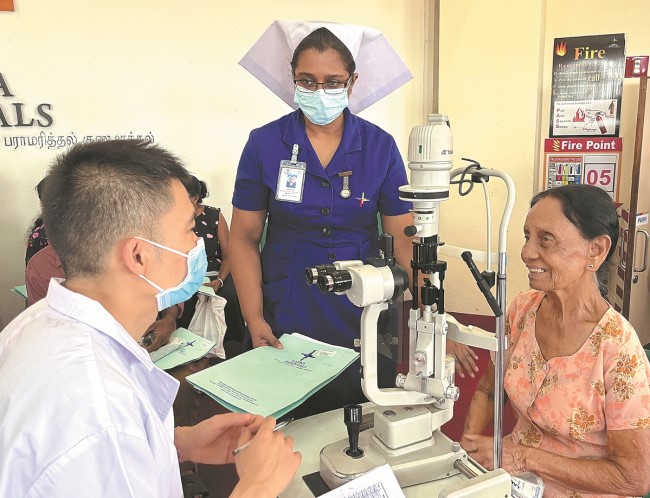
A Chinese doctor talks with a patient before a cataract operation in Sri Lanka. [Photo provided to China Daily]
Sustainable help
At the end of 2022, the China-aided Nigeria Agricultural Demonstration Center, located in the country's capital Abuja, was put into operation, aiming to scale up the African nation's agricultural productivity and development.
The Nigerian center is the first aid project run by a Chinese enterprise after its completion, allowing Chinese investments and expertise to continue playing their roles to yield economic benefits and promote sustainable development of the country's agriculture.
Through technology transfer, the demonstration center aims to identify projects suitable for Nigeria's agricultural development, facilitating the transfer of China's agricultural production capacity advantages to Nigeria, said Wang Yun, manager of the demonstration center.
Operation of the demonstration center is also expected to promote the development of the Chinese company Green Agriculture West Africa Limited, so as to better realize sustainable development of the center, said Wang, from the company, which was established in 2006 and positioned itself as a partner for China-Africa agricultural development and cooperation.
With 49 employees, nine from China and 40 from Nigeria, the company has been planting crops such as rice, maize, vegetables and mushrooms in demonstration fields, and a rice processing line has also been put into use.
Chinese experts from the company also offer training to local farmers at the center. In 2023, the center provided training to 75 local people on rice technology and peanut processing.
Chinese agritech expert Wang Xuemin said that he had taught Nigerians about modern agricultural technology in areas such as rice cultivation, seed breeding technology, soil and fertilizer sciences, agricultural machinery and pest control.
Wang Xuemin has been engaged in agricultural assistance in Nigeria for 20 years. "In 2003, when I set foot on African soil for the first time, I didn't anticipate that I would have such a deep connection with the continent," he said.
The backward agricultural infrastructure and technology, and lack of agricultural machinery, constrained food production in the country, Wang Xuemin said.
Dispatched as a technical expert for the China-Nigeria "South-South Cooperation" agricultural project at that time, Wang Xuemin introduced basic Chinese agricultural tools, such as threshers and huskers, to farmers in Nigeria.
Immersing himself in the local perspective, Wang Xuemin said he deeply explored the country's agricultural environment, trying to use his professional knowledge to overcome various challenges in crop cultivation, and especially in rice technology.
After many years of research and development of seeds, in 2017, Wang and his colleagues successfully developed a high-yield rice variety, GAWALR1. Its yield is about 30 percent higher than the most popular local rice varieties.
Due to the good quality and high yield, the seeds have been widely recognized by Nigerian farmers, he said.
The variety has been promoted and cultivated for over five years, boosting rice production in Nigeria by over 2 million metric tons and benefiting at least 200,000 households, he added.
To better train local farmers, Wang wrote a nearly 70-page textbook based on his experiences over the past two decades. It is all about how to deal with practical problems, he said.
"The trainees I have instructed are scattered across various rice-producing regions in Nigeria," he said.
Wang Xuemin said he plans to work in Africa for five to 10 more years.
"I hope to fully utilize the demonstration center to continuously innovate our agricultural technologies to adapt to the evolving local production environment," he said.
He said he will also promote agricultural machinery in the continent, develop more high-quality varieties, and intensify training efforts to empower more local people with the necessary technical skills.
The goal is to resolve food security concerns at their source and to have a sustainable impact on the region, contribute to long-term food sufficiency and enhance the livelihoods of local communities, he said.
"Additionally, we also hope to use the platform of the demonstration center to support China's agricultural enterprises in going global and to promote agricultural cooperation between China and Africa, said Wang Yun, the manager of the center.
zhoujin@chinadaily.com.cn



